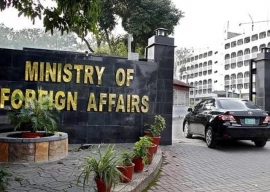
The Supreme Court decided on Thursday that it would define the terms ‘Sadiq’ and ‘Ameen’ — hitherto unexplained in the country’s Constitution — while hearing the prime minister’s disqualification case.
The three-member bench of the apex court, headed by Justice Jawwad S Khawaja, was hearing an appeal filed by Gohar Nawaz Sindhu of the Insaf Lawyers Forum, against a Lahore High Court (LHC) ruling which had dismissed his petition for the disqualification of Prime Minister Nawaz Sharif last month.
In its order, the court also observed that it is essential to interpret Articles 62, 63 and 66 of the Constitution as the issue has been raised for the first time after the passage of the 18th amendment.
The petitioner claimed the premier had first asked army chief General Raheel Sharif to act as a ‘mediator’ between the government and protesting parties – the Pakistan Tehreek-e-Insaf (PTI) and Pakistan Awami Tehreek (PAT) – and to serve as a ‘guarantor’ to any agreement between the two sides.
Referring to Articles 62, 63 of the Constitution, he contended that the premier had lied before parliament and denied making any such request to the army chief.

Under Article 62 of the Constitution, an individual shall not be qualified for election or chosen as a member of parliament unless he is honest and upright. Whereas, Article 63 says that any member of parliament can be disqualified if he ceases to be a citizen of Pakistan, or acquires the citizenship of a foreign state and has been convicted by a court.
While directing the petitioner to submit his interpretations regarding the case, the bench also summoned the attorney general for assistance regarding the maintainability of the petition.
Weighing in on the ambiguity surrounding the two terms, Justice Dost Muhammad Khan said the definition of ‘Sadiq’ and ‘Ameen’ were not included in Article 260 of the Constitution.
Upon this, the petitioner urged the court to define both the terms, as well as the immunity that parliamentarians enjoy under Article 66 of the Constitution.
The petitioner contended that parliamentarians had passed a law that absolves all high office holders in the government, including the prime minister, from contempt of court proceedings for their actions, but no such legislation had been proposed to prevent defamation against the army.
Nevertheless, Justice Khawaja said it is not the court’s role to formulate public policy, it can only interpret law, adding that no individual is above the law.
During Thursday’s proceedings, the bench also decided to disassociate two petitions, filed directly by Pakistan Muslim League-Quaid (PML-Q) chief Chaudhry Shujaat Hussain and PTI leader Ishaq Khakwani, to disqualify the premier.
Interestingly, though the bench has not issued notice to the attorney general’s office, two additional attorney generals have been attending the proceedings. The case was adjourned till October 23.
Published in The Express Tribune, October 17th, 2014.
COMMENTS (1)
Comments are moderated and generally will be posted if they are on-topic and not abusive.
For more information, please see our Comments FAQ










































Does any one see any ambiguity in regard to article 63, it says plainly that any member of parliament can be disqualified if he ceases to be a citizen of Pakistan, or acquires the citizenship of a foreign state and has been convicted by a court. Now if we apply article 62 to the current or past NA or PAs, the whole gang will be disqualified, then we have to import people from Mars to rule us. I think article 62 was inserted by that despicable dictator Zia who himself was not ‘Sadiq’ and ‘Ameen’ , as a matter of fact he used the religion to perpetuate his draconian rule but God had a reserved seat for him and we all know where that is located.